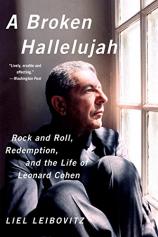A Broken Hallelujah: Rock and Roll, Redemption, and the Life of Leonard Cohen
Review
A Broken Hallelujah: Rock and Roll, Redemption, and the Life of Leonard Cohen
Liel Leibovitz begins the preface to his biography of Leonard Cohen with the following assertion: “This is not a biography of Leonard Cohen.” What are we to make of such a claim? Pure affectation? Perhaps. It’s certainly a bold opening line, and as a critic, it rather pulls the rug from under your feet; you no longer have a fixed lens through which to view the book.
As one progresses through A BROKEN HALLELUJAH, it becomes ever clearer how this is not a conventional biography. For one thing, it is very much on the short side. Leibovitz does not cram his book with every scrap of information he can scour concerning his subject’s life; he does not present us with Cohen’s every adolescent pimple, nor do we see the poet/singer brushing his teeth at night or practicing his guitar in the mornings. This slender volume has very specific concerns, which are rendered deftly through a number of haunting episodes. Leibovitz sets out not to write yet another life of a musician, not really to see him as a singer at all, but to imagine him as a kind of Old Testament Prophet. “So what is the Prophet Cohen telling us?” he asks at the end of his preface. “And why do we listen so intently?”
"This slender volume has very specific concerns, which are rendered deftly through a number of haunting episodes."
To a secular Jew such as myself, this is both an appealing and a suspect premise. On the one hand, Laughing Lenny is just the sort of prophet I can get on board with. After all, one does not recall Isaiah or Elijah writing about getting “head/ On the unmade bed” the way Cohen does. On the other hand, there is the nagging fear that this is another tired attempt to make religion “cool” to an increasingly secularized society. This gives Leibovitz a precarious road to follow, and he treads it judiciously.
The religiosity of Cohen’s lyrics has been apparent from his first record. The archetypal stranger is in his words “just some Joseph looking for a manger”; in another early song, a woman clutches her lover desperately, as though he is “some kind of crucifix.” Despite the overtly Christian bent of these allusions (and many of Cohen’s other lyrics), Liebovitz does a fine job of setting Cohen up as a figure whose home is really amidst the leaders found in the Torah. The grandson of a Talmudic scholar, Cohen never renounced his Jewish identity despite spending long periods studying with a Zen Buddhist. In a few glittering moments, Leibovitz brings Cohen the prophet standing magnificently before us. At the disastrously anarchic Isle of White festival, he tames an angry mob of 600,000 people by telling them a “goddamn bedtime story.” Shades of Daniel taming the lions abound. As a child whose father has just died, Cohen writes a message to his deceased parent, wraps it up in his father’s tie, and buries it in the garden of the family home. It is a ritual no less moving than the chanting of the Mourner’s Kaddish.
Inevitably, the grandeur of Leibovitz’s vision of Leonard Cohen sometimes overstretches itself. For instance, on Cohen’s decision to ditch the classical guitar in favor of those now hopelessly dated keyboard-generated backing tracks, Leibovitz writes, “If the guitar had been the instrument to write songs that played out like diary entries, the Casio was a portal to a higher plain of consciousness.” If spiritual transcendence were so easily achieved, it would be a wonder we needed prophets at all. Still though, overreaching is far from the greatest fault in a biographer, and this unusual synthesis of Jewish theology and pop music history makes for an amusing and thoughtful little book. Finally, Cohen’s message to us, as transcribed by Leibovitz, is one that is simple enough but quite beautiful. “All that humans [can] do” he writes, “[is] go about life, admit defeat, and try to find beauty in all that remained.”
Reviewed by Frederick Lloyd on April 20, 2014
A Broken Hallelujah: Rock and Roll, Redemption, and the Life of Leonard Cohen
- Publication Date: March 23, 2015
- Genres: Biography, Music, Nonfiction
- Paperback: 288 pages
- Publisher: W. W. Norton & Company
- ISBN-10: 0393350738
- ISBN-13: 9780393350739





